|
During the time I grew up, I had a very happy good childhood-until my first grade. The year I got into first grade was the year that the Cultural Revolution started. That was 1966. I was a troubled girl, but I was a troubled star. Even though I caused trouble in kindergarten and the day-care center, they always put me on the TV show, because I was pretty talented at singing and dancing. I was a good little performer. One thing is quite different about day-care in China. My parents sent us to what we called week care. You drop your kids on Monday morning and pick them up on Saturday night. You stayed there the whole week. You got to spend one day with your parents. Al: That was before the Cultural Revolution? Diana: Yes, it was. I never heard of a mother who stayed home and took care of the children. Both my parents worked. They dropped us off in that kind of week-care school. We called it kindergarten. I think most of my childhood memories were while in kindergarten. My parents were really busy. Even though we came home over the weekend, I actually spent a lot of time with my aunties or friends of my parents. My parents were very busy actors and put on shows during the weekends. They were always busy, and I had lots of memories of being in the back of the stage while watching them put on the makeup and then walk on and off the stage.
I didn't have a normal education in China. I learned the basics like phonetics, spelling and pronouncing words. During the Cultural Revolution, they sent all of the teachers to the country and replaced them with workers from the factories or peasants from the country. I remember my elementary school principal was in the Army. We went to the factory and worked with the workers. So, I know how to fix a car.
Al: When you weren't working in the factory, what did you do? Diana: I knew how to sing all the Beijing opera, the standard show. There were always organized entertaining groups that claimed to evangelize Mao. That was the purpose of these entertainment groups. Every group wanted me. I was the youngest little star. I didn't get paid for it, but I got some Mao's buttons in place of payments. So, I collected Mao's buttons and still have some of them to this day. I traveled around the various districts in Beijing with this group. I was even involved in my mom's theater group. Al: What about your father? Diana: My father strongly believed in education. He never went to college. I think he probably graduated from high school. When he was young, his parents were kind of old. So, he grew up in a very strange, big family. He had to make a living for himself. He knew how important education was, and he wanted me to be able to read. He was the one to teach me how to use the brush pen and start to trace the characters so that I could learn to write. But the Cultural Revolution really made him confused on how to be a father. He wanted me to read, but at the same time the Communist Party said, "No, you can't read anything. Nobody does homework." I remember one day I was playing in the yard and my father called me saying that I had to come in and read some book and do some homework. One of he little girls who was playing there said, "Hey, now it is the Cultural Revolution. Nobody does homework!" My father said that his kids did. One part of him had to be politically correct and the other part of him wanted me to get education. I read some of the world classics like Anna Karenina and Jane Eyre. My father encouraged me to read them, but he pretended that he didn't know it. I can tell now how hard it was for my father. Most of the books weren't all there, nothing was complete. I think maybe that gave me some kind of idea that you don't really have to read a whole book. I started to imagine what was next in the missing part. We passed books secretly between kids. We called it the underground channel. Since most of the books were not all there, we finished them ourselves. We kept on writing the end of the story. All these books are hand copied, because we couldn't find the whole book. Most of the books are burned or locked in a place because of the Cultural Revolution. They are always going into some intellectuals' homes and destroying books and things. Then the kids picked over the mess that was thrown away. That's how I got some books.
During the Cultural Revolution, my parents were afraid that we would get into trouble with the Red Guard if they came to the house because they were intellectuals. My parents sent me to the south of China. It was about 500 miles from Shanghai. My mom's brother lived there. There they thought I could avoid trouble, but actually my mother's brother and sister-in-law were both intellectuals. There was a lot of trouble there. People just grabbed the guns and weapons from the military. So many people got killed. Then in the middle of the night, they knocked on my uncle's door to go to the hospital because someone was dead. It happened all the time. And there was almost no food. When I told my mother she wouldn't believe it. I slept with my cousin, my uncle's daughter. I slept on this side of the bed and she slept feet to feet that way. I had to get up at 2:00 am went to the market with the nanny because we had so many kids. Each had to wait in a different line for food. What they sold at that time was the powder of the egg yolk, soy sauce powder, and things like that. When I think of it now, it was scary; I didn't know it then. I felt like it was fine. During that time, I would basically eat radishes for almost all the time-radish and some egg yolk powder. I was fine; I never got sick.
Al: The army? Diana: Well, everything was provided by the government from food, clothing, everything. I didn't go to college in China. I just was in the army for three years. While there, I tried so hard. I wanted to be an entertainer, an artist. I learned how to draw, how to act, how to dance, how to sing with my parents' friends. They didn't have jobs at that time so what they did was to teach me. I also learned to play some Chinese instruments. I worked hard at entertaining and the army. I was really hard on myself. I picked up Taekwondo very fast and still am a pretty good fighter. I don't get scared when I get on the street. As long as the other person doesn't have a gun, I can deal with it. Al: Whatever happened with your entertainment career? Diana: I tried so hard wanting to be a dancer, but I failed. Either my background wasn't good enough or my body was too athletic-not right for dancing. I was facing all this failure constantly, no matter how much I tried. There were so many things that I tried to do to please my parents, my teachers, and myself. I tried and tried and never was accepted. Back then, you had to write a confession every day-like a journal. They wanted you to confess what you had done wrong. Finally, I got accepted by one of those army groups because of my parent's connections. I felt very self-conscious, because I got in this group not because I was good but because of my parent's friends. But I worked very hard. After a year in the entertainment group, they sent me to hospital as a nurse. I really enjoyed it, I loved it. I thought that maybe I could become a doctor, but there was no way because I had real education. After one year in military hospital, they put me in the office. There my job was to the movie machine.
However, that didn't succeed. Fortunately, I became very famous quickly, and a recording company had their eye on me. They belonged to the central government so they had the power to take my personal file. Even today, I don't know what is in it. Every individual has a folder that contains whatever you have done from your elementary school all the way to your work. It contains punishment and rewards that you had gotten. It was a pretty powerful way of control.
Al: A lot of red tape? Diana: Yes, but it is a lot of luck too. It depends on the immigration officer that day if he is happy or not happy. Just on his judgment, that five minutes, he decides whether or not one is allowed to travel outside of China. The guy behind the counter that day just happened to love music and knew that I sang. He asked if I would sing for him. I said that I would sing after I got my visa. He said, "Okay, go tell your sister to put $6000 in your bank account, and I will give you a visa." I don't know how my sister did it, because she didn't have much money. After the money was deposited, I came back to see the immigration guy, but he was no longer working at the desk. The blood went all the way from the top of my head all the way to my toes. Oh, my gosh. This guy said that he didn't know my case. I was fortunate though that the guy who wanted me to put the money in the bank was working in the back. He walked past the window and said, "Oh, I know this girl. She can go." It was incredible; it was my 29th birthday. However, after I came here, I then regretted it. I didn't speak the language, and I didn't know anything. So, I wanted to go home. I know I have two entrants on my visa; so, I went back to China. I just wanted to review the dream I had before-to give a big concert-I wanted to be a star. When I went back, I struggled. I fought so hard in all my life. I couldn't just give it up. So, I bit my tongue and went back to the stage. Then I came back to the States. Al: How was the cultural shock on your second trip? Diana: Going to school in Texas didn't seem to me to be America. I thought that America should have all the high-rises like Chicago or New York, but everything was flat. Al: Did you know any English? Diana: I knew 26 letters. That was it. I knew how to say, "Hello." I went to a language institute first for five semesters to pass a test to get into college. Still, I couldn't understand a word of what the professor was talking about. I got a typical Texan to talk about American history before 1860. American history and government was the toughest topic for me. I had no clue how to follow it. I'm still adjusting to the cultural shock today. The more I understand about this culture, the more I need to know: the way to communicate with people and the way that you carry yourself. Chinese tend to be more indirect. There is no direct communication although the younger generation is now getting to be more direct. Lots of professors view Chinese students as not confident, because they keep on denying what they can do. Chinese don't say, "I did well." Rather they would say that they didn't do that good or without your help, it wouldn't have been possible. That is a Chinese value. We consider that to be a virtue-being humble.
Al: You're married to an American; how did you meet your husband? Diana: When I was in the language institute, he was just starting working for EDS. He was the inside council and a young lawyer there and had just turned thirty. I also had turned thirty. He liked Tai Chi, the Chinese exercise. He was involved in a Chinese group that got together every weekend. The Tai Chi master knew one of my classmates through the Chinese institute. The Tai Chi master invited my classmate for Chinese buffet, like brunch to meet my husband, because my husband wanted to study Chinese. So the Tai Chi master wanted to make a language partner with these two men. My classmate brought me with him. I went with the group for Chinese brunch, and Joe was there. He said he noticed me and paid a lot of attention to me, but I didn't talk to him. I didn't really pay attention to anyone; I was just there for the brunch. I didn't feel comfortable talking to Americans. There was still the language barrier, because I couldn't fluently communicate or express myself. Joe told the tai chi master that the next time you invite me to his house to let him know. Every weekend, I would go to that place. So, he just invited himself. He started to teach me English, and I started to teach him Chinese. I talked to him a couple times in Chinese, but he didn't improve that much. But my English started improving pretty quickly, but that's how we met. Al: How many children do you have? Diana: I have two children. Two boys one seven and the other is four.
Al: Why do you need to go back to school? Diana: Why do I need school? I'm not sure. After the kids got a little older, I thought it's either now or never. So, I went back to DePaul, and now I really love the school. All the years of working in China, I learned how to learn. What are the American schools looking for from the students? Not behavior, not well behaved students. They are looking for somebody who can be challenged, that can really think, that can be creative. I feel that I can do that. Al: I read the article that CNA wrote about you. The "Three T's" intrigued me since my wife and I are going to one of them in a couple of weeks. Can you tell my readers what the "Three T's" are. Diana: When in China, don't mention the "Three T's." This is advice that we give to all the foreign travelers. We tell them not to get involved in any kind of political discussions in general and avoid the "Three T's" completely: Tiananmen Square fight, which started on June 4, 1989, Tibet and Taiwan. Those are very sensitive topics for Chinese officials.
6/01 |







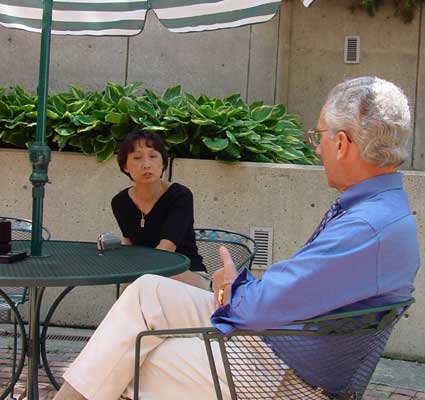 Al: A friend of mine who works
for CNA gave me a brochure about you. They had you conduct a seminar on
doing business in China. She said that you were well received and were very
interesting person to interview. In addition, I'm planning to be in China this
summer, and it would be helpful for me to talk with you. You were born in
China; can you tell me about growing up there and how you got to the States?
Al: A friend of mine who works
for CNA gave me a brochure about you. They had you conduct a seminar on
doing business in China. She said that you were well received and were very
interesting person to interview. In addition, I'm planning to be in China this
summer, and it would be helpful for me to talk with you. You were born in
China; can you tell me about growing up there and how you got to the States?
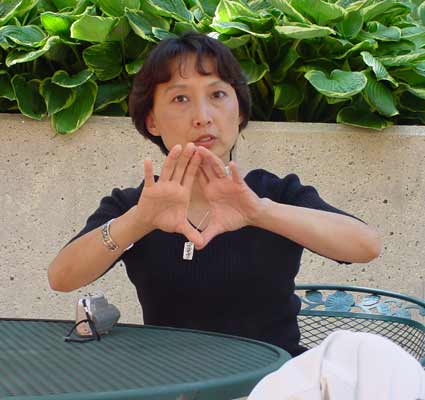 Al: Was their acting more old
Chinese or more Western style.
Al: Was their acting more old
Chinese or more Western style.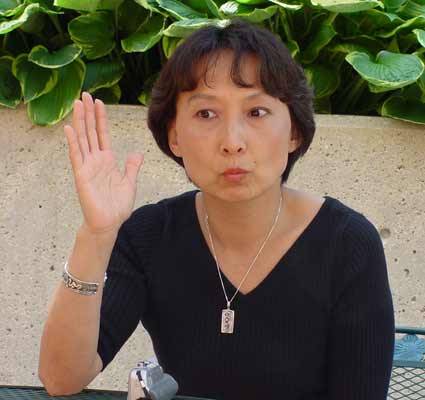 Al: When was this?
Al: When was this?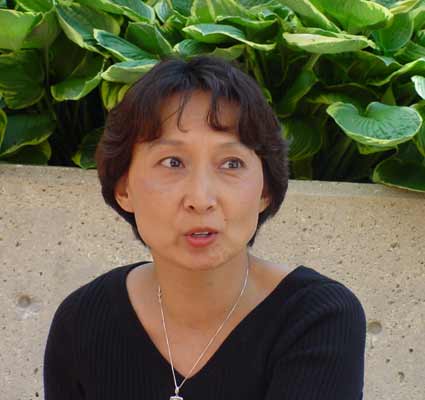 Al: I thought everyone spent
time in the military instead of school.
Al: I thought everyone spent
time in the military instead of school.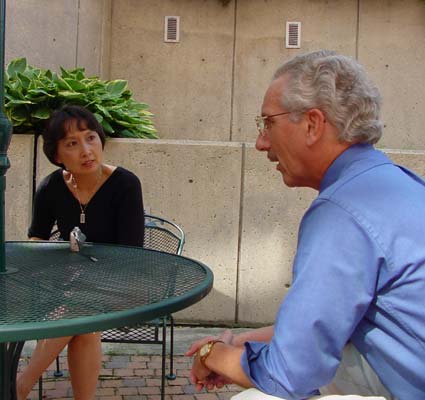 Al: What a wonderful
revolution. When did the Cultural Revolution end?
Al: What a wonderful
revolution. When did the Cultural Revolution end? After three
years in the army, the Communist Party gave me a couple choices: either I could
sell fish in the supermarket or be a factory worker. I chose being a factory
worker. I learned to paint pianos, and I learned how to paint very well. So,
now, I can paint all of my house. Being a worker, that was very depressing to
me because that is definitely something I do not want to do with my life. So, I
fought to get out of there. Almost everybody accepted their fate. If your job
is assigned to the factory, that was it. I said, "No." I used my father's
connections to get into some temporary project with the movie and television
production group. I traveled with this group all the way from Beijing to Hong
Kong, and all over. It was the early 80s and pop music popular. I thought,
"Gee, I can do better than that. I thought that I was better than all the
singers on the stage." I asked my father if he could find some friends who
could get me into a pop singer group. Through my father's connections, a
hotel's entertainment group accepted me. It is very hard for anyone to fight
for his or her legal status. I was a worker and in my personal file in Beijing,
my personal identification, everything was there. You couldn't really leave and
go to another place. It was impossible to have mobility. Geographically and
socially, you can't really move easily. But I fought it and was able to move.
I didn't care. I traveled with this entertainment group and worked at that
hotel and made myself famous in first month. So, I forget about the factory.
The thing is you can't survive like that too long. The government will start to
keep track of where you are and what you are doing. I again used my mom's
connections to try to see if they can move my identification.
After three
years in the army, the Communist Party gave me a couple choices: either I could
sell fish in the supermarket or be a factory worker. I chose being a factory
worker. I learned to paint pianos, and I learned how to paint very well. So,
now, I can paint all of my house. Being a worker, that was very depressing to
me because that is definitely something I do not want to do with my life. So, I
fought to get out of there. Almost everybody accepted their fate. If your job
is assigned to the factory, that was it. I said, "No." I used my father's
connections to get into some temporary project with the movie and television
production group. I traveled with this group all the way from Beijing to Hong
Kong, and all over. It was the early 80s and pop music popular. I thought,
"Gee, I can do better than that. I thought that I was better than all the
singers on the stage." I asked my father if he could find some friends who
could get me into a pop singer group. Through my father's connections, a
hotel's entertainment group accepted me. It is very hard for anyone to fight
for his or her legal status. I was a worker and in my personal file in Beijing,
my personal identification, everything was there. You couldn't really leave and
go to another place. It was impossible to have mobility. Geographically and
socially, you can't really move easily. But I fought it and was able to move.
I didn't care. I traveled with this entertainment group and worked at that
hotel and made myself famous in first month. So, I forget about the factory.
The thing is you can't survive like that too long. The government will start to
keep track of where you are and what you are doing. I again used my mom's
connections to try to see if they can move my identification. 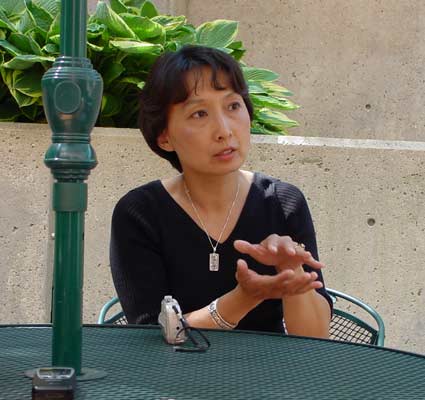 Al: How did you do financially at your job?
Al: How did you do financially at your job? Al: They didn't want you do leave for good.
Al: They didn't want you do leave for good.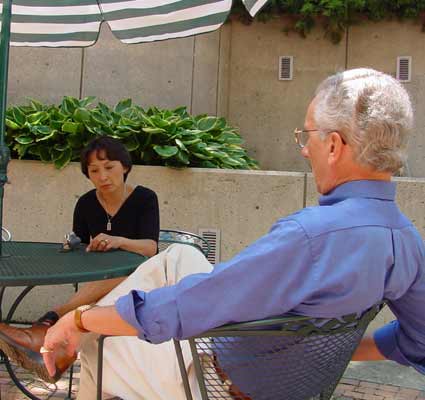 Al: We all think that a person
from China is either a gifted student or professionals. If there were one
Chinese student in a high school, we would expect that person to be the
valedictorian.
Al: We all think that a person
from China is either a gifted student or professionals. If there were one
Chinese student in a high school, we would expect that person to be the
valedictorian. 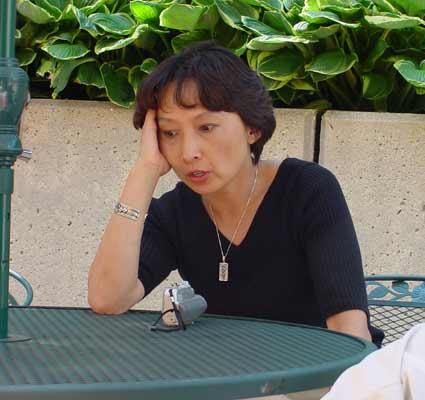 Al: I also understand that you are going to
school? What's your major?
Al: I also understand that you are going to
school? What's your major?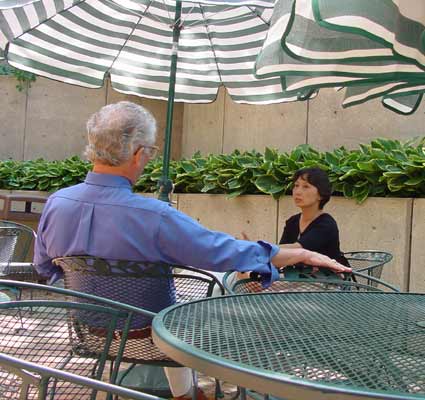 Al: We in the West hear a
great deal about the Chinese desire to save face, can you help my readers and me
to understand this national trait?
Al: We in the West hear a
great deal about the Chinese desire to save face, can you help my readers and me
to understand this national trait?